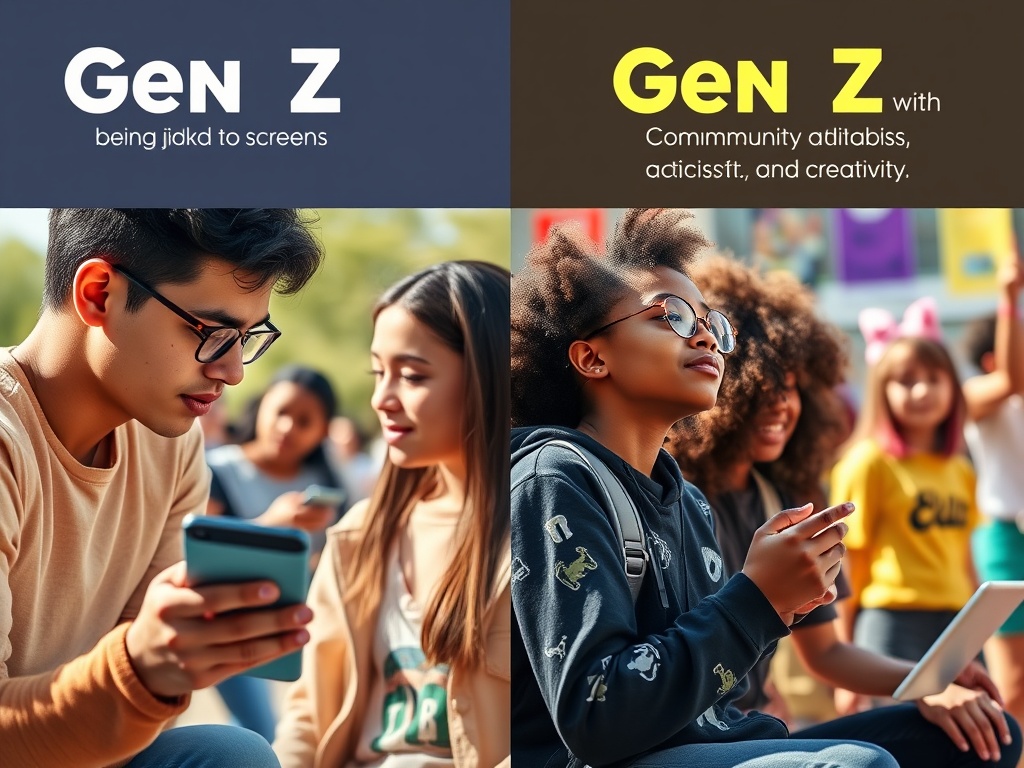Understanding Gen Z: Beyond the Stereotypes

In recent times, it seems every other headline is yet another critique of the Gen Z generation. We’re labeled as lazy, accused of clocking out early, and deemed unfit for customer service roles – I’ve encountered all of these claims time and again. Apparently, we’re solely responsible for the decline of work culture, the economy, and quite possibly, the very fabric of society. It’s all very accurate, of course.
Take a typical day last week, for instance. Picture me comfortably seated in my chair, cradling a matcha latte made with oat milk, while my AirPods play my favorite playlist and I scroll through TikTok as if I’m conducting vital research. My desktop? A chaotic mix of unfinished documents and sticky notes shouting, “Get it together.” But let’s be real, the allure of Pilates was more compelling than any looming deadline. When my boss inquired about my progress, I flashed a rehearsed smile, all the while secretly planning my next brunch outing with friends. Priorities, right?
Across from me was a middle-aged colleague, buried in a mountain of spreadsheets and an endless stream of emails, his attire reminiscent of a bygone corporate era. I leaned over and jokingly asked, “What do you think your generation did wrong?” He blinked, clearly taken aback, then launched into a monologue about something called “work ethic.” I nodded along, mentally mapping out my next Hinge date. As the clock struck 4:55 PM, I began gathering my things, fully aware that the only thing my boss would notice was a fleeting glimpse of my bag as I made my escape.
Now, let’s set the record straight. None of that actually happened. I don’t slouch, nor do I sip on matcha lattes. I don’t own AirPods, and TikTok hasn’t seen me in years. Pilates? That sounds like a form of self-inflicted torture, and I actually maintain a good rapport with my boss – though I wouldn’t turn down a promotion if he’s reading this.
And about that so-called “work ethic”? I respect it. I always have. Climbing the ladder isn’t achieved through coasting. Individuals who hustle, grind, and stay late aren’t merely engaged in a pointless endurance test; they’re often the ones at the pinnacle of their careers. Of course, they’re putting in the hard work. As for me, I’ve deleted my dating apps, I seldom leave the office on time, and unless there’s a genuinely important dinner or drinks outing on the horizon, I’m right there, investing the hours too.
So why have these absurd Gen Z stereotypes gained so much traction? As a proud member of Gen Z, born in 1997 and teetering on the brink of millennial territory, I’ve heard critiques from both sides. But have we truly lost our way? Or are we, like Socrates, who lamented, “The children now love luxury; they have bad manners, contempt for authority; they show disrespect for elders and love chatter”? Have we become so accustomed to critiquing younger generations that we’ve forgotten what it truly means to just get by?
Because “just getting by” today looks vastly different from what it did for young people even a decade ago. We’re navigating an era of economic instability not only in the UK but globally. The cost of living crisis is deepening while wages remain stagnant, rendering financial independence more a distant dream than an attainable goal. Job hopping isn’t merely about pursuing some fantasy of “dream job fulfillment” – it’s a necessity to keep pace with inflation and rising costs. We’re expected to continually upskill and demonstrate our value in an increasingly competitive job market that seems to shift beneath our feet every few years.
Then there’s the workplace itself. Expectations are escalating. We are the “digital generation,” which comes with the assumption that we should instinctively master every new platform, system, and software update thrown our way. Meanwhile, we’re still trying to grasp the systems that older generations had the luxury of easing into – now, the training wheels are off, and we’re expected to be hitting the ground running.
Communication styles have evolved, and Gen Z is adapting to a work environment predominantly sculpted by boomers and millennials – an environment where flexible hours, remote work options, and even the concept of a four-day workweek were already in motion before we arrived on the scene.
So, forgive us if we’re navigating the complexities of where we fit into this new working world – a world we didn’t create but are somehow being blamed for wanting to improve.
And it’s not just about work. We’re profoundly engaged with social and political issues – equality, climate change, social justice – matters that should concern everyone. Yet at some point, “woke” shifted from a badge of honor to a term of derision, when in reality, it signifies an awareness of our surroundings. We exist in a time where political beliefs shape dating app bios, where online discussions can be more divisive than constructive, and where holding an opinion is both a virtue and a potential pitfall. Yes, we’re vocal – but hasn’t every younger generation faced similar accusations?
Socrates himself lamented the youth of his era, and here we are, centuries later, still caught in the same cycle. So before rolling your eyes and branding Gen Z as lazy, overly sensitive, or entitled, consider the reality we are trying to navigate. We’re not seeking sympathy or demanding an easy path. We’re simply attempting to figure things out – just like every generation before us. And if that means advocating for change, then surely that’s what progress is meant to look like. Now, if you’ll excuse me, I need to take a moment to reflect on how self-aware and, perhaps, insufferable I’m being.




